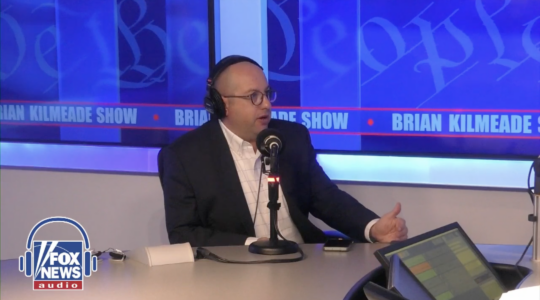ISRAEL VOTES 2009
ASHDOD, Israel (JTA) – “Lieberman! Lieberman! Lieberman!” a cluster of young Israelis shouted into megaphones as Avigdor Lieberman, leader of the nationalist Yisrael Beiteinu party, made yet another stop on his Election Day tour.
“Ashdod: Vote Lamed for Lieberman,” their voices boomed across a busy intersection of this southern port town, known as a party stronghold. Lamed is the Hebrew letter on the ballot representing Yisrael Beiteinu.
The usually stern-faced Lieberman smiled, looking confident and relaxed. Thronged by well-wishers, he shook hands, hugged generously and waved at a steady stream of drivers who honked their car horns in support.
Similar scenes were repeated throughout Lieberman’s day, which started early in the morning in the small West Bank settlement of Nokdim, where he lives.
Lieberman, who immigrated to Israel from Moldova as a teenager and still speaks with a pronounced Russian accent, has become the unlikely new star of Israeli politics as his party has ridden a wave of popular frustration in Israel with the Palestinians and Israel’s own Arab minority. The candidate’s campaign slogan, “No Loyalty, No Citizenship,” has touched a chord among Israeli Jews who view Arab Israelis as a potential fifth column.
Detractors call Lieberman an extremist, even a racist. Lieberman says he’s neither.
“I’m a pragmatist,” he told JTA, saying utopian visions for the country had failed.
Despite his harsh rhetoric on the Palestinians, Lieberman is a proponent of the two-state solution. One of the cornerstones of his platform is a plan to redraw the country’s borders to include more Jews and exclude more Arabs by trading parts of Israel populated by Arabs to the Palestinian state in exchange for Israel annexing West Bank settlement blocs.
His other signature issue is a loyalty oath requirement, which would curtail Israeli Arab political power. According to Lieberman’s vision, Israelis who refused to sign such an oath and do not perform national or military service would lose their citizenship and national voting rights, though they could remain in the country as permanent residents.
As Lieberman’s campaign neared the finish line Tuesday, he appeared buoyed by polls predicting Yisrael Beiteinu — literally “Israel Our Home” — would capture enough seats to become the third-largest party in the Knesset behind Tzipi Livni’s Kadima and Benjamin Netanyahu’s Likud.
Preliminary election results had his party winning 14 or 15 seats in the Knesset, likely enough to edge Labor out of third place. His new position of power is expected to be key to determining the makeup of the next coalition government.
“I’m happy to hear there is a high voter turnout so far,” he said on Election Day.
“First of all, to all the young people, I say come out and vote,” Lieberman said. “We call on all citizens — Jews, Muslims and Christians, everyone — to vote. Our country needs a clear voice.”
Lieberman has been unabashed in his call for a decisive victory by the right wing, which includes Likud. He and Netanyahu have a long history together; Lieberman served as chief of staff for Netanyahu when the Likud chief was prime minister in the late 1990s.
In the city of Rishon Le Zion, south of Tel Aviv, Shahar Orgad, 24, was among those welcoming Lieberman. Wearing a “No Loyalty, No Citizenship” T-shirt, he said he was thrilled to see the candidate.
“It’s really exciting because I believe in his path,” Orgad said. “This is the right direction, to link loyalty with citizenship.”
Peri Amar, 29, who also was in Rishon Le Zion, agreed.
“We have no problem with Arabs if they are loyal to the country and do their service,” Amar said. “We are not racist. We just think that people who live here have to be loyal to the country.”
In the last three elections, since Yisrael Beiteinu has founded, the party has attracted votes from immigrants from the former Soviet Union. But the party’s following broadened this election as Lieberman’s message has resonated with young native Israeli voters such as Amar and Orgad.
As Lieberman made final campaign stops in Kiryat Gat and Ashkelon, both of which were struck by Hamas rocket fire during the recent war in Gaza, supporters referred to Lieberman as the future defense minister and even a future prime minister. Others told him they were choosing his party after years of loyalty to parties such as Likud and the Orthodox Shas.
Lieberman’s message seemed to carry particular cachet in areas subject to Hamas rocket fire, where residents tend to favor stringent military measures against Gaza.
Irena Etinger, Lieberman’s spokeswoman, fielded calls on her mobile phone from media outlets around the world throughout Election Day. She said her day began at dawn with a call from Japan.
“Everyone wants to speak to him and find out who he is,” Etinger said of the candidate.
On a press bus accompanying his tour Tuesday, Lieberman told JTA that as a young man he never imagined he would go into politics. Literature, he said, was his primary interest. Lieberman said he had written an award-winning play while a student in Moldova, along with short stories and a movie script with a suspenseful plot.
“Politics was a glitch in navigation along the way,” said the candidate, who late Tuesday appeared poised to steal the show. “Maybe I should have gone to Hollywood.”
JTA has documented Jewish history in real-time for over a century. Keep our journalism strong by joining us in supporting independent, award-winning reporting.





